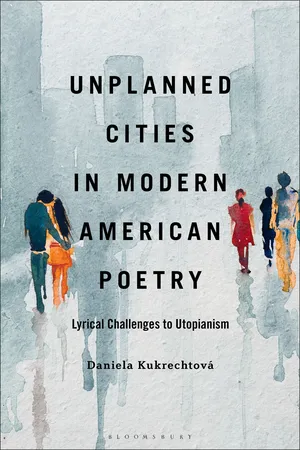
eBook - PDF
Unplanned Cities in Modern American Poetry
Lyrical Challenges to Utopianism
- 241 pages
- English
- PDF
- Available on iOS & Android
eBook - PDF
About this book
Reveals how five modern American poets challenged prevailing discourses about urbanization through lyrical representations of cities and the diverse people who lived in them.
In early 20th-century America, industrialization and the influx of immigrants and rural migrants into urban centers fostered a certain representation of and distaste for cities and their inhabitants. The dominant discourse was one of containment through utopian planning and violent reshaping, often reflected in both policy-making and writings about cities during this time. Yet as Daniela Kukrechtová identifies, urban literature also reveals voices that challenged that narrative.
Unplanned Cities in Modern American Poetry shows how the formally innovative works of five poets – Jean Toomer, William Carlos Williams, Hart Crane, Frank O'Hara, and Gwendolyn Brooks – worked against anti-urban discourse. Their works displayed a love for disorderly cityscapes and the actual urbanites who inhabit them, promoting the radical idea that cities were for people while revealing the extreme dystopian/utopian discourses that helped create and maintain divisions and disparities.
Kukrechtová argues that, besides offering a radical critique, these poets also used their poetry to imagine the mental and emotional attitudes of urban dwellers toward their environment. She therefore offers the urban ecocritical approach often missing in literary analyses of modern American poetry. Simultaneously, the lyrical and socially-engaged imagination in these works – that is, the human implications of various plans, designs, and policies that helped create the modern American city – represent a voice often unheard in urban studies and its history.
In early 20th-century America, industrialization and the influx of immigrants and rural migrants into urban centers fostered a certain representation of and distaste for cities and their inhabitants. The dominant discourse was one of containment through utopian planning and violent reshaping, often reflected in both policy-making and writings about cities during this time. Yet as Daniela Kukrechtová identifies, urban literature also reveals voices that challenged that narrative.
Unplanned Cities in Modern American Poetry shows how the formally innovative works of five poets – Jean Toomer, William Carlos Williams, Hart Crane, Frank O'Hara, and Gwendolyn Brooks – worked against anti-urban discourse. Their works displayed a love for disorderly cityscapes and the actual urbanites who inhabit them, promoting the radical idea that cities were for people while revealing the extreme dystopian/utopian discourses that helped create and maintain divisions and disparities.
Kukrechtová argues that, besides offering a radical critique, these poets also used their poetry to imagine the mental and emotional attitudes of urban dwellers toward their environment. She therefore offers the urban ecocritical approach often missing in literary analyses of modern American poetry. Simultaneously, the lyrical and socially-engaged imagination in these works – that is, the human implications of various plans, designs, and policies that helped create the modern American city – represent a voice often unheard in urban studies and its history.
Frequently asked questions
Yes, you can cancel anytime from the Subscription tab in your account settings on the Perlego website. Your subscription will stay active until the end of your current billing period. Learn how to cancel your subscription.
At the moment all of our mobile-responsive ePub books are available to download via the app. Most of our PDFs are also available to download and we're working on making the final remaining ones downloadable now. Learn more here.
Perlego offers two plans: Essential and Complete
- Essential is ideal for learners and professionals who enjoy exploring a wide range of subjects. Access the Essential Library with 800,000+ trusted titles and best-sellers across business, personal growth, and the humanities. Includes unlimited reading time and Standard Read Aloud voice.
- Complete: Perfect for advanced learners and researchers needing full, unrestricted access. Unlock 1.4M+ books across hundreds of subjects, including academic and specialized titles. The Complete Plan also includes advanced features like Premium Read Aloud and Research Assistant.
We are an online textbook subscription service, where you can get access to an entire online library for less than the price of a single book per month. With over 1 million books across 1000+ topics, we’ve got you covered! Learn more here.
Look out for the read-aloud symbol on your next book to see if you can listen to it. The read-aloud tool reads text aloud for you, highlighting the text as it is being read. You can pause it, speed it up and slow it down. Learn more here.
Yes! You can use the Perlego app on both iOS or Android devices to read anytime, anywhere — even offline. Perfect for commutes or when you’re on the go.
Please note we cannot support devices running on iOS 13 and Android 7 or earlier. Learn more about using the app.
Please note we cannot support devices running on iOS 13 and Android 7 or earlier. Learn more about using the app.
Yes, you can access Unplanned Cities in Modern American Poetry by Daniela Kukrechtová in PDF and/or ePUB format, as well as other popular books in Literature & Literary Criticism in Poetry. We have over one million books available in our catalogue for you to explore.
Information
Table of contents
- Cover
- Contents
- List of Figures
- Acknowledgments
- Introduction: A Case for a Contra-Symbolic City in Modern American Poetry
- 1 “Remove the [red] tape” of Respectability: Jazzy Transformations in Jean Toomer’s Washington, DC
- 2 “Who are these people”: William Carlos Williams Walks with the Crowd in Paterson, New Jersey
- 3 “Tilting … momently” between the Perfect City and the Embodied Urban Experience: Subversive Wordplay in Hart Crane’s The Bridge
- 4 Remembering “You” in the City: Toponyms and Ludic Spaces in Frank O’Hara’s Kinesthetic Poetry
- 5 The Death and Life of a Chicago Edifice: Gwendolyn Brooks’s “In the Mecca”
- Notes
- Bibliography
- Index